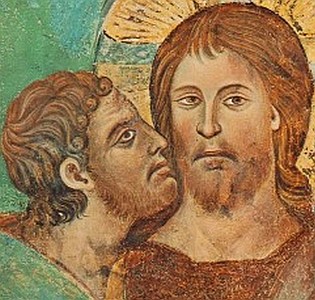
The Web Directory and Video Podcast about Video Podcasting
Podcast Salad is a video podcast about video podcasting. Subscribe to the show find out what's new each week. Then check out the directory of more than 1,000 video feeds and 10,000 episodes. Search to find the content you want.

Click Here To Watch It Now!
Click Here To Watch On YouTube!
Understand What It Is All About:
The term 'podcasting' is bandied about very often these days because it denotes a new way in which radio shows reach their audience.
Recently Featured On Podcast Salad

Laughing At The Eucharist: Judas' 'Gospel'
There is nothing more annoying to students of New Testament literature than the media's sensationalistic touting of the so-called "secret gospels." The reason that it is frustrating is not because there is some new body of information available offering us a window into a religious world far removed from our own, but that it is hyped up as something that challenges, and possibly undermines, all of Christianity. The latest of these is the so-called "Gospel of Judas".
Indeed it is quite difficult to understand. Without some background help, a novice reader will have a very difficult time comprehending the bafflingly odd reality it describes. For this, we recommend Scot McKnight's blog series and a text NT Wright. The former offers a great running commentary with background information and thoughtful criticism, and the latter is an eloquent skewering of a "gospel" that is "historically worthless."
In McKnight's fifth post he quotes the popular liberal bible scholar Bart Ehrman from the National Geographic book The Gospel of Judas: In brief, one of the competing groups in Christianity succeeded in overwhelming all the others. This group gained more converts than its opponents and managed to relegate all its competitors to the margins. This group decided what the Church's organizational structure would be, leading to is grudual enrichment. It decided which creeds Christians would recite. And it decided which books would be accepted as Scripture.
This embodies the foundation of all the anti-Christian sentiment in the debate over the canon and the suppression of the "secret Gospels." The "winners" became the "orthodox" party and the "losers" became the "heretical" party; the "winners" took all and the "losers" got the shaft. McKnight notes, The Da Vinci Code, Bart Ehrman's several books, Elaine Pagel's books, and others, along with this recent publication are all rooted in this singularly potent idea: the orthodox party suppressed alternative voices. Alternative voices deserved to be heard; therefore, we need to hear what these folks believed about the Christian faith. On top of this, for many, there is the added suggestion that we should try to recover the kind of diversity, bewildering as it was, that characterized pre-Nicean Christianity.
What is so patently naive about this kind of thinking is that it utterly fails to offer a sound explanation as to why the "orthodox" party's success was so "overwhelming" and the "competitors " such dismal failures. Opting for a conspiracy theory at the Council of Nicea seems to be the most common answer, painting a picture of a religiously intolerant Roman government mandating central tenants of faith and squelching opposition with the sword. But this is for the gullible. It is not a cannon/suppression issue, for if it was, why not spin a yarn about the "suppression" of other Christian writings like the Didache, the Shepherd of Hermas, the epistle of Barnabas, or the letters of Clement? Could it be because that there was something distinctly deeper that formed the backbone of these writings?
If we are to be extremely generous and admit that there was a kind of "diversity" in Christianity that allowed for two rival theological parties we must examine the worldviews of both Gnosticism and "orthodoxy." Gnosticism probably drew from an eclectic array of sources like Greek philosophy, Roman Mystery Religion, and Indian Mysticism (there are no firm answers) that synthesized into a theology that believed, " God was wholly transcendent and utterly unknowable separated far from the material universe " Human beings are "droplets" of the same spiritual substance as God that somehow became "trapped" material bodies

" There is a myriad of gods, one of which rebelliously created a material universe " Creation and fall coincide, thus making the created material order inherently evil and sinful " Salvation is to escape from the bondage of the material existence through a kind of special knowledge-usually self-knowledge
This backdrop is plainly in the background of the "Gospel of Judas. It uses the language of docetism-that Jesus sometimes "appeared" to them "as a child", meaning Christ's body was fundamentally a charade that could be shifted like a mutant X-Man. It portrays Jesus laughing at a prayer his earthbound disciples made in thanking God for bread-something that God never made. Jesus confesses he is from the "immortal realm of Barbelo," a supreme divine Mother, and that some lesser god named Saklas created human beings. All of this is told to Judas alone apart from the other earthbound disciples, making him elect for special knowledge that culminates in the revelation of his role of "betraying" Christ (i.e. sacrificing the earthly man that clothes me so that he might return to the divine, i.e. escape the material world). By this self-knowledge and his following actions, Judas attains a primacy in the afterlife over the other disciples whose "priests" (i.e. the subsequent "orthodox" party) are portrayed in a vision as those who sacrifice their children and wives and who sleep with other men. Contrast that with the source of the "orthodox" party: the Hebrew Scriptures-what Christians refer to as the "Old Testament." They teach that God is one and there is no one like him and that there is none beside him. This One God creates (Genesis) and what he makes is "very good." Though he is transcendent, he is also immanent, and condescends to a finite humanity made in his image on a personal level where he delivers and gives law (Exodus). But this God is rejected by his people for a human king, Saul. Saul fails, and then is replaced by "man after God's own heart" (David). God promises David that he will establish his line on the throne forever. Even though God's people are rebellious, he remains faithful (Hosea) and present (Ezekiel), and promises salvation to them through his Suffering Servant (Isaiah).
The differences between these two backgrounds are irreconcilable. The bare assertion that there were "two rival parties within Christianity", as if it were like Democrats and Republicans contending for power, is obliterated by infinitely incompatible beliefs about the nature of reality. Democrats and Republicans at least agree on the contents of the Constitution. The historicity of the Gospel of Judas is analogous to a story about how the Founding Fathers had to debate communists when drafting the Declaration of Independence.
People who believe that the Gospels of the New Testament and the Gnostic Gospels share an equal footing in the realm of "diversity" happily ignore the fact that half of the Bible was already in existence forming and shaping the religious climate of first century Palestine when the earliest of the Gospels, Mark's, was written. The decisive difference between the "orthodox" party and the Gnostics is that the "orthodox" believed in, and accepted the Hebrew Scriptures as authoritative. The Gnostics did not.
Long before a Constantinian settlement, people were reading Paul's letters, Mark's Gospel, Matthew's Gospel, the Luke-Acts account, the letters of John, and the book of Hebrews believing that God became flesh-a heresy in Greek theology-that declared that this "God-man"-Jesus-was Lord and that he inaugurated a new creation through the coming of his Kingdom that challenged all earthly powers and rulers, including those of Rome, who did not blink an eye at the thought of throwing them to the lions.
Perhaps today where personalized individual "spirituality" reigns supreme the Gnostic version of faith is attractive. It offers liberty to self-absorbed seekers to shape a Jesus that either meets one's personal psychological needs or helps them escape reality. But for those of us who cannot laugh at the sacraments of Christ's body and blood being given for us as they were prophesied about in Isaiah, we shall remain fools for the God who gives life to the dead.
Show All Podcasts in Directory
Copyright 2013 - PodcastSalad.com

